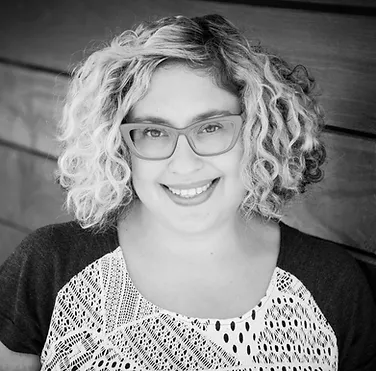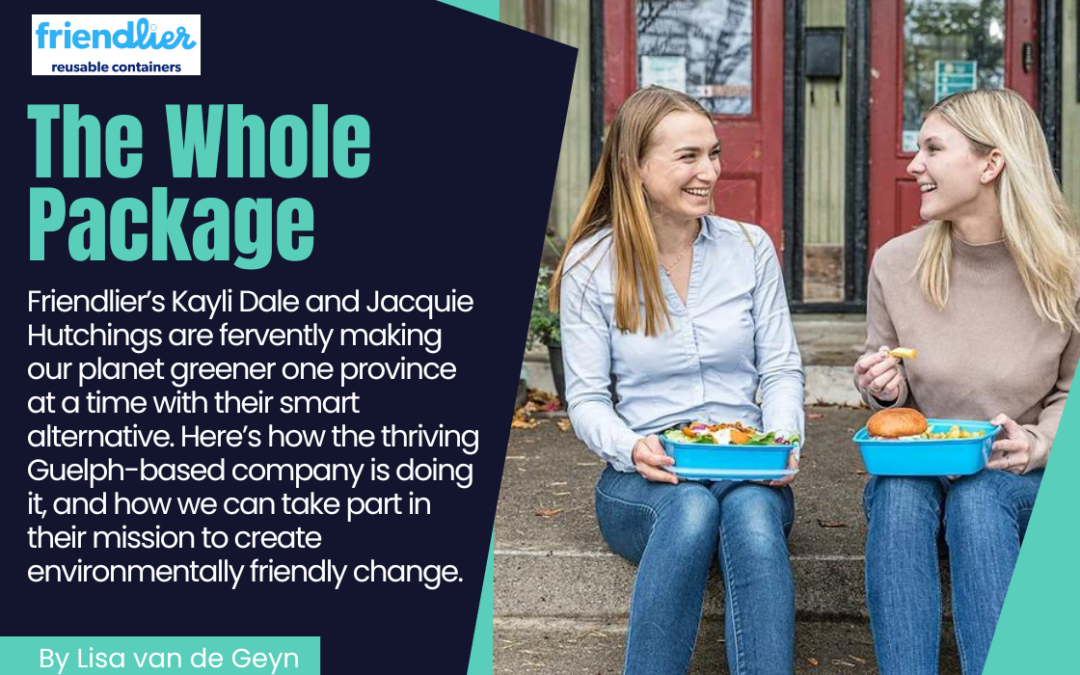Single-use takeout containers make up one-third of all plastic packaging in Canada, and, while we’ve all played a role in contributing this waste to landfills, Friendlier’s Kayli Dale and Jacquie Hutchings are fervently making our planet greener one province at a time with their smart alternative. Here’s how the thriving Guelph-based company is doing it, and how we can take part in their mission to create environmentally friendly change.
Kayli Dale and Jacquie Hutchings couldn’t predict the role they’d play in changing the planet for the better when they met on their first day of university, but a lot can happen in nine years.
The friends are the cofounders of aptly named Friendlier—a Guelph, Ont.-based startup on a mission to reduce single-use plastic waste created by disposable food packaging. The company is “planet driven, people led,” and they’re redefining the takeout industry with the safe, reusable packaging system they’ve developed. There’s been a lot of talk about the overabundance of takeout packaging in our landfills lately—especially post-pandemic; we were ordering out more than ever during COVID-19 to support local eateries. The garbage created from these plastic vessels prompted the federal government to ban six types of single-use plastics in 2022 in their effort to achieve zero plastic waste by 2030. “By getting rid of problematic plastic food packaging, replacing single-use packaging with reuse-refill systems and ensuring that plastics, if needed, are designed to be safely reused, recycled or composted, we can all help move Canada toward zero plastic waste,” said the Honourable Steven Guilbeault, the Minister of the Environment and Climate Change, back in August 2023. Last December, the Federal Court overturned Canada’s ban on single-use plastic (finding it unreasonable and unconstitutional), but that’s only added fuel to Friendlier’s fire. “Canada is behind other countries in the world that are already doing this—more than 70 have implemented some type of ban on single-use plastic. That’s because there are better options now,” says Dale. Friendlier is one of those options, and—good news for the environment—the company is flourishing.
The Backstory
Before they cofounded Friendlier, Dale and Hutchings were chemical engineering students at the University of Waterloo and weren’t planning on futures as entrepreneurs. But when they noticed the amount of waste and emissions in a slew of industries they considered pursuing, they realized damage to the environment was a consequence they couldn’t ignore. “We knew we didn’t want to contribute to it; we wanted to do something that would help the planet,” Dale says. In their third year, they packed up and travelled to Sweden, where they studied for several months. “It opened our eyes. Their culture is slower-moving—it’s not about speed and convenience. Instead, they focus on minimalism and sustainability, and they are much less reliant on single-use packaging. Experiencing this was revolutionary to us. We wanted to bring those concepts and principles home and make them work in a society that operates differently.”
That trip was the real impetus of Friendlier, and by the time the pair graduated in April 2020, they decided they’d move to Guelph (a city benefitting from the Smart Cities grant, creating Canada’s first circular food economy) and committed one year to developing reusable packaging systems to see how much impact they could make. “We knew we had to change public perception. If it’s not convenient, it’s hard to get people to do it, so that’s where we started. We also had to get people past the idea of not throwing takeout packaging in the trash,” she says. Their containers, which are manufactured in Ontario, are made of pure polypropylene, they’re BPA-free and they can be used (and commercially sanitized) up to 100 times before being recycled. They’re also stackable, spill-proof and they keep food hot. Early adopters of Friendlier’s pilot programs gave Dale and Hutchings good feedback, and the duo started testing different ways to track and incentivize clients to make opting for their reusable options more enticing. “To get the food-service industry to swap out single-use containers for an eco-friendly alternative, we knew we’d have to do the heavy lifting—ensure the quality of our products and make the process as simple as possible,” says Dale.
“Having angel investors support us, offer advice and make important connections has been so helpful. We couldn’t have done this without them.” – Kayli Dale, Friendlier cofounder
The Reuse Program
Friendlier is super straightforward. Customers—restaurants and cafes, caterers, markets, food truck operators, universities and corporate offices, for example—order containers (boxes, lidded containers, bowls and cups), serve their products, Friendlier picks up and sanitizes used dishes, then clients can reorder and start the process again. And when it comes to patrons who, say, order a poke bowl at their favourite participating takeout spot and opt for it to be served in a reusable bowl, this is how it works: Folks request a Friendlier container, pay a small deposit (50 cents or $1), eat their meal, scan the QR code on the bottom of their bowl (so their deposit is reimbursed upon return), then they drop the item into a Friendlier collection bin. Dale says they took a page from the beer-bottle-deposit model—they give the deposit back when people return their empties. “It’s something people already understand, so we took the concept and digitized it. The app makes it even easier,” says Dale.
It’s so easy to use that nearly 1.5 million containers have been sent back to Friendler’s commercial sanitation facilities (there’s one in Guelph and Ottawa, and they’re currently building a facility in Vancouver) to be reused. “We’re getting truckloads and truckloads of containers back—we didn’t expect this kind of volume in the beginning,” she says. The locations they service—Ontario, Western Quebec and Greater Vancouver—and their customer base have also grown. While they started out with independent restaurants and grocers, they’ve expanded to supplying subscription-meal companies, as well as corporate food-service providers in office buildings and universities—current clients and partners include Scotiabank, Loblaw Companies, Compass Group Canada, Humber College and Laurier University, to name a few. “We always pictured our system in those environments, but because of COVID it was hard to test before now. Many of our clients have aggressive environment, social and corporate governance (ESG) targets, and partnering with us has allowed them to quantify the impact they’re making to stakeholders and customers—they can clearly measure the difference this makes.”
The Angel Investor Journey
Dale says the route Friendlier took when it came to securing angel investment was unconventional, but not for lack of trying. The pair reached out to most of Ontario’s angel groups but were never invited to pitch to members. It wasn’t until they got connected with Nadine Martel, a member of Capital Angel Network (CAN), while cold networking that they started to getting traction. “Nadine told us she liked what we were doing and said her angel group would also be interested. We ended up with many angels coming on after she reached out to her network,” Dale says. Their pre-seed round was in 2021, and they were exclusively backed by angels and grants (including a $500,000 investment from the Government of Canada’s Federal Economic Development Agency for Southern Ontario, also known as FedDev Ontario) until their latest seed round closed last year—they raised $7.5 million. “Angels have done so much for us; they played a huge role in getting us to the next stage of fundraising—we wouldn’t be here today if we didn’t have them,” she says, adding Ottawa-based CAN has been their biggest supporter from Ontario’s angel investment ecosystem. Of course, it hasn’t all been about the financial benefits—Dale says the introductions and networking have been invaluable, and their angels are quick to help with whatever her team needs. “They’re always really receptive and we know we can reach out to them when we have a question or need something, and they’ll be there.”
The Future
The company’s key word for 2024 is “expansion,” and Friendlier’s plans are plentiful. “We want to dominate Canada,” Dale says, adding their recent entry into the Vancouver market is helping them build the playbook to opening new areas. “There have been a lot of different pilots and niche, hyperlocal systems tried out, but nothing has shown potential when it comes to scaling, but that’s where we are now—we’re showing we can work at a national level,” she says. They’re also growing their leadership team, as well as reassessing their tools (including updating analytics for customers) and product offerings—their new coffee cup, manufactured in Guelph, will no doubt be a market disruptor. Making a positive environmental impact is the biggest tenet behind Friendlier, but Dale and Hutchings are mindful of the role they’re playing in job creation for likeminded people looking to do good. “When we were graduating, we were looking for jobs that would make an impact and we really couldn’t find anything. We have more than 50 on our team now and we’ve created the kinds of jobs we were looking for—offering opportunities to others has been great,” she says. “Seeing all the seedlings we planted coming together, and the impact we’re making, has shown us we can keep growing this, and that’s really exciting.”
Last Word: Q&A with Nadine Martel, Friendlier angel investor
Q: How long have you been an angel investor and what groups are you part of?
A: I participated in the Female Founders’ Angel Academy in 2019 and became a member of Capital Angel Network a few months later. I also joined Coralus (previously SheEO) as an activator around the same time and was a founding champion and investor with SheBoot (since 2020). I’m a member of the Investment Committee for Audaxa Ventures and have a Champion Investor Membership with The51.
Q: What impressed you about Kayli and Jacquie? Why were you interested in investing in Friendlier?
A: I was intrigued by what they were doing and introduced Friendlier to other CAN members. Friendlier’s vision to divert all food packaging and cutlery waste from landfills really resonated with me and the other CAN investors, as we all recognized and had witnessed the problem of single-use plastic in the restaurant and food–retail sectors. I was impressed with the research and development Kayli and Jacquie conducted to come up with their solution, and believed they had great product-market fit. Both seemed to have a clear understanding of the problem, their product, business model and marketing strategy.
Q: Angels are integral when it comes to providing much-needed funds to founders, but there’s more to being an angel investor than writing a cheque. How have you been able to help Friendlier?
A: I’ve provided additional support to Kayli and Jacquie by introducing them to CAN members, and they were able to secure funding from eight additional group members. I also introduced them to VCs I’m acquainted with, and to my husband, who was previously the CTO at Shopify—he was able to offer specific technology mentorship. I’ve recommended Friendlier to local businesses in Ottawa where I saw a good fit.
Check out Friendlier website here!
Interested in becoming part of the dynamic angel investor community in Ontario? Explore our wide network of supported Angel Investor Groups. Discover your local group with the details provided on our website. Get involved and start making an impact today!
👉 Find a Group Here
Success Story was written by Lisa Van De Geyn

Lisa van de Geyn is a self-proclaimed magazine junkie and more-than-20-year veteran in Canada’s magazine industry. The multi-award-winning writer and editor has worked for many of the country’s most venerable publications, including Chatelaine, Canadian Living, Today’s Parent, House & Home, Toronto Star, Reader’s Digest, CAA Magazine and Globe & Mail. She’s been covering the fascinating stories of angels and founders for several years, working with Spark Centre, NACO, Access IO, Capital Angel Network, and Angel Investors Ontario (she served as editor-in-chief and feature writer of [XV].
Lisa is a mom to two teenagers and is very fond
of her many streaming services.
